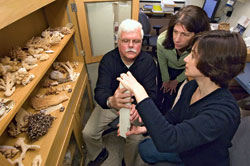| Ocean and Climate Change Institute |
|
 |
 Enlarge image
Enlarge image |
| Terry Joyce, center, examines a core from a coral with Anne Cohen, front, and Delia Oppo. Anne and Delia are funded by the Institute to study what tropical corals can reveal about past climate changes.
(Photo by Tom Kleindinst, WHOI) |
| |
| Related Links |
» Ocean and Climate Change Institute
|
Pursuing greater understanding of the ocean’s role
in climate change, the Ocean and Climate Change Institute
(OCCI) launched support for a number of new research projects,
one new OCCI fellow, and a graduate research assistant. The
Institute also provided continued support for ongoing fellows
and projects.
The OCCI funded several projects to establish or enhance Atlantic
and Arctic Ocean observing systems and further the understanding
of the roles of the Arctic and Northern Atlantic in abrupt
climate change. Projects include looking at the deep Arctic
as an indicator of climate shifts in the last millennium;
laboratory studies of oceanic mixing and its role in climate
change; placing constraints on past changes in the ocean conveyor
using proxies; a numerical model simulation of freshwater-induced
abrupt climate change; and enhancements of particle and carbon
flux studies at Line W (a 250-mile instrument array off Cape
Cod) and of freshwater export off southeast Greenland. The
Institute is continuing support for projects looking at freshwater
import and export from the Arctic; abrupt climate change as
reflected in ocean sediments in the Arctic, Caribbean, and
in the western north Atlantic; using gliders to obtain transoceanic
sections of temperature and salinity between Greenland and
the Iberian Peninsula; and a numerical study of the sensitivity
of the Gulf Stream pathway to changes in the ocean conveyor.
The Institute supported Scott Doney (MC&G) in his third
year as a fellow, Bernadette Sloyan (PO), who left WHOI to
return to her home base in Hobart, Australia, and Jeff Donnelly
(G&G, shared with COI), who examines natural archives
of Holocene and Pleistocene environmental change in coastal
regions. Peter Winsor (PO) was appointed a fellow in abrupt
climate change. He is a specialist in Arctic oceanography
and is doing numerical simulations of abrupt climate change
and collecting new data in the Arctic from ships and drifting
instrumentation.
Rosemarie Came, a previous Joint Program student in paleo-oceanography,
matriculated and student support was shifted to a third year
student in the Marine Chemistry and Geochemistry department,
Nathalie Goodkin, who is using long-lived coral at Bermuda
to study climate variability during the past millennium.
—Terrence Joyce, Institute Director
|
|

